-
 bitcoin
bitcoin $87959.907984 USD
1.34% -
 ethereum
ethereum $2920.497338 USD
3.04% -
 tether
tether $0.999775 USD
0.00% -
 xrp
xrp $2.237324 USD
8.12% -
 bnb
bnb $860.243768 USD
0.90% -
 solana
solana $138.089498 USD
5.43% -
 usd-coin
usd-coin $0.999807 USD
0.01% -
 tron
tron $0.272801 USD
-1.53% -
 dogecoin
dogecoin $0.150904 USD
2.96% -
 cardano
cardano $0.421635 USD
1.97% -
 hyperliquid
hyperliquid $32.152445 USD
2.23% -
 bitcoin-cash
bitcoin-cash $533.301069 USD
-1.94% -
 chainlink
chainlink $12.953417 USD
2.68% -
 unus-sed-leo
unus-sed-leo $9.535951 USD
0.73% -
 zcash
zcash $521.483386 USD
-2.87%
How much money can you make from Bitcoin mining?
The profitability of Bitcoin mining can vary due to factors like electricity costs, hardware efficiency, and the fluctuating price of Bitcoin, affecting the return on investment timeframe.
Jan 09, 2025 at 11:34 pm

- The profitability of Bitcoin mining depends on several factors, including electricity costs, hardware efficiency, and the price of Bitcoin.
- Miners can earn a return on investment (ROI) within a few months to years, depending on the market conditions.
- Cloud mining and mining pools offer alternative options for those without the necessary resources for independent mining.
- Bitcoin mining involves significant upfront investment and ongoing operating expenses, such as electricity and hardware maintenance.
- The reward for mining a block of Bitcoin decreases over time due to the halving events, leading to a gradual reduction in miner revenue.
- Estimate Electricity Costs: Calculate your electricity consumption per day and multiply it by the cost per kilowatt-hour (kWh) to determine your daily electricity expenses.
- Determine Hardware Efficiency: Research the hashrate (processing power) and power consumption of potential mining hardware. Compare different options to find the most efficient machines for your budget.
- Track Bitcoin Price: Monitor the value of Bitcoin in real-time as it directly affects the profitability of mining.
- Calculate Potential Earnings: Use online calculators or software to estimate your potential earnings based on the above factors. Consider the block reward, transaction fees, pool fees (if applicable), and hardware depreciation.
- Factor in Operating Expenses: Include the costs of hardware maintenance, cooling, and any other ongoing expenses associated with mining.
- Acquire Mining Hardware: Purchase or rent dedicated mining hardware, such as ASIC (Application-Specific Integrated Circuit) miners or GPU (Graphics Processing Unit) rigs.
- Join a Mining Pool (Optional): Consider joining a mining pool to share resources and increase your chances of finding a block. This involves paying a small fee to the pool.
- Set Up Mining Software: Download and configure mining software, such as CGMiner or MinerGate, to connect your hardware to the Bitcoin network.
- Specify a Wallet Address: Provide a Bitcoin wallet address where the earned rewards will be transferred.
- Monitor and Adjust: Regularly monitor your mining rig's performance, adjust settings if necessary, and keep your hardware running optimally.
- Cloud Mining: Rent remote mining power from dedicated providers without the need for physical hardware or technical expertise.
- Mining Pools: Join a mining pool to combine computing resources with other miners and increase the chances of finding a block.
- How long does it take to mine a Bitcoin?
- The average time to mine a Bitcoin block is approximately 10 minutes. However, the actual time can vary depending on the network hashrate and the miner's computing power.
- Is Bitcoin mining profitable?
- The profitability of Bitcoin mining depends on the factors outlined above. It can be profitable during periods of high Bitcoin prices, low electricity costs, and efficient hardware.
- What are the risks of Bitcoin mining?
- Bitcoin mining involves significant upfront investment, hardware maintenance risks, potential changes in market dynamics, and a decline in miner revenue over time due to halving events.
- Is Bitcoin mining legal?
- The legality of Bitcoin mining varies by jurisdiction. Check local laws and regulations before starting mining to ensure compliance.
- What is a mining pool?
- A mining pool is a group of miners who combine their resources to increase their chances of finding a block and receiving rewards.
Disclaimer:info@kdj.com
The information provided is not trading advice. kdj.com does not assume any responsibility for any investments made based on the information provided in this article. Cryptocurrencies are highly volatile and it is highly recommended that you invest with caution after thorough research!
If you believe that the content used on this website infringes your copyright, please contact us immediately (info@kdj.com) and we will delete it promptly.
- Ripple, Banks, & Cash: The Digital Treasury Revolution and Washington's New Blueprint
- 2026-01-31 22:40:02
- Bitcoin's High-Wire Act: Leverage Ratio Spikes, Volatility Looms on the Horizon
- 2026-01-31 22:20:02
- Spur Protocol's SON Token: A Listing Saga and Its Murky Price Outlook
- 2026-01-31 22:15:04
- Bitcoin Price Breakdown Looms as Institutions Pull Billions: BTC Faces Critical Juncture
- 2026-01-31 22:10:07
- Tria Airdrop's Second Act: Season 2 Kicks Off, XP Details Unveiled
- 2026-01-31 22:05:08
- Silver Liquidation Raised Eyebrows: What Happened, and What It Means
- 2026-01-31 22:00:07
Related knowledge
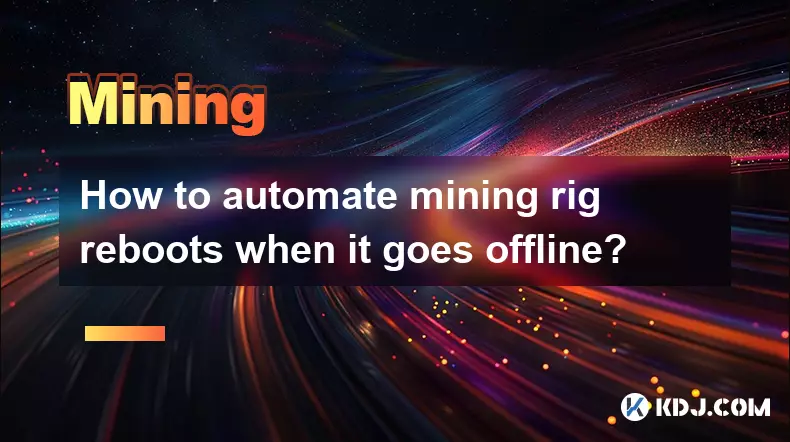
How to automate mining rig reboots when it goes offline?
Jan 23,2026 at 11:00pm
Monitoring System Integration1. Deploy a lightweight agent on the mining rig’s host OS that continuously reports hash rate, GPU temperature, and pool ...
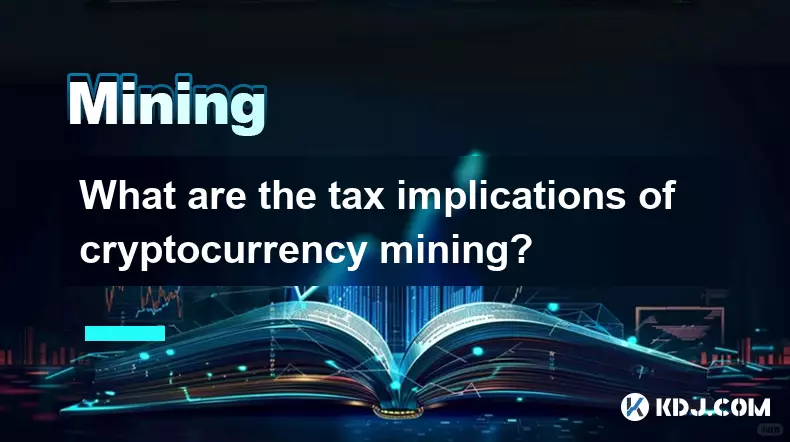
What are the tax implications of cryptocurrency mining?
Jan 23,2026 at 02:40am
Tax Treatment of Mining Rewards1. Cryptocurrency received as a reward for mining is treated as ordinary income by the IRS at the fair market value on ...
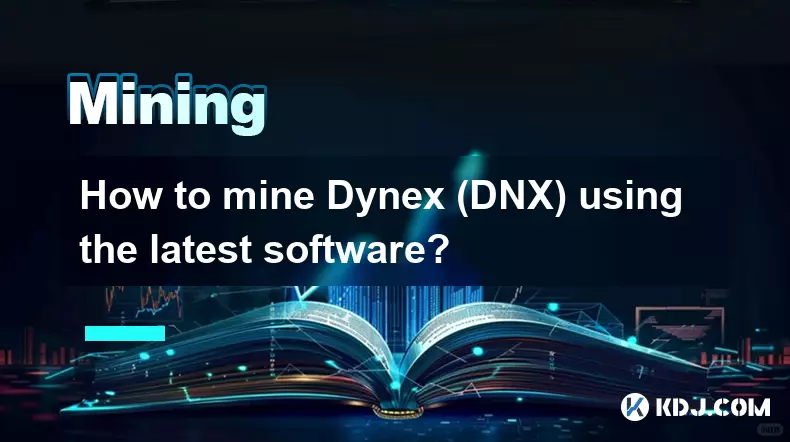
How to mine Dynex (DNX) using the latest software?
Jan 22,2026 at 10:00am
Understanding Dynex Mining Fundamentals1. Dynex (DNX) operates on a proof-of-work consensus mechanism optimized for neuromorphic computing workloads, ...
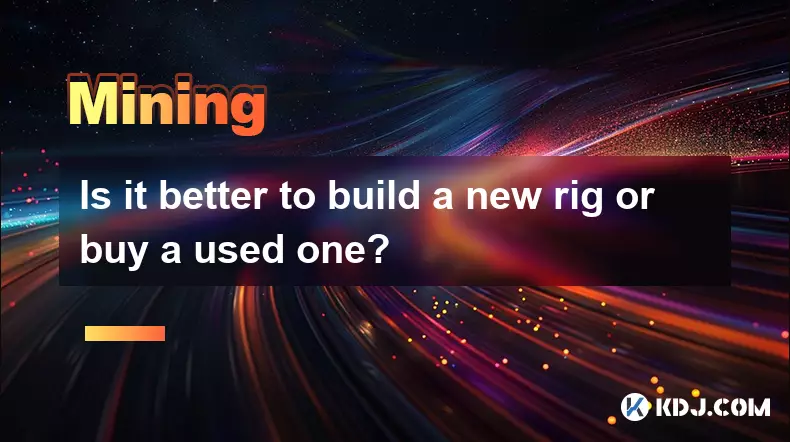
Is it better to build a new rig or buy a used one?
Jan 24,2026 at 10:20pm
Cost Efficiency Analysis1. New mining rigs come with manufacturer warranties, typically covering components for one to three years. This assurance red...
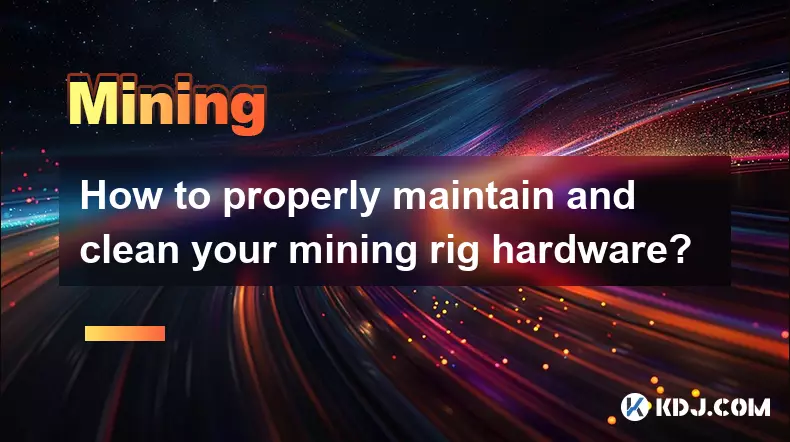
How to properly maintain and clean your mining rig hardware?
Jan 19,2026 at 11:00am
Cooling System Inspection and Optimization1. Dust accumulation inside fans and heatsinks directly reduces thermal dissipation efficiency, leading to h...

What is the best way to sell your mined crypto for cash?
Jan 20,2026 at 02:59am
Choosing the Right Exchange Platform1. Select an exchange with strong regulatory compliance and a proven track record of secure withdrawals. Platforms...

How to automate mining rig reboots when it goes offline?
Jan 23,2026 at 11:00pm
Monitoring System Integration1. Deploy a lightweight agent on the mining rig’s host OS that continuously reports hash rate, GPU temperature, and pool ...

What are the tax implications of cryptocurrency mining?
Jan 23,2026 at 02:40am
Tax Treatment of Mining Rewards1. Cryptocurrency received as a reward for mining is treated as ordinary income by the IRS at the fair market value on ...

How to mine Dynex (DNX) using the latest software?
Jan 22,2026 at 10:00am
Understanding Dynex Mining Fundamentals1. Dynex (DNX) operates on a proof-of-work consensus mechanism optimized for neuromorphic computing workloads, ...

Is it better to build a new rig or buy a used one?
Jan 24,2026 at 10:20pm
Cost Efficiency Analysis1. New mining rigs come with manufacturer warranties, typically covering components for one to three years. This assurance red...

How to properly maintain and clean your mining rig hardware?
Jan 19,2026 at 11:00am
Cooling System Inspection and Optimization1. Dust accumulation inside fans and heatsinks directly reduces thermal dissipation efficiency, leading to h...

What is the best way to sell your mined crypto for cash?
Jan 20,2026 at 02:59am
Choosing the Right Exchange Platform1. Select an exchange with strong regulatory compliance and a proven track record of secure withdrawals. Platforms...
See all articles





















![Ultra Paracosm by IlIRuLaSIlI [3 coin] | Easy demon | Geometry dash Ultra Paracosm by IlIRuLaSIlI [3 coin] | Easy demon | Geometry dash](/uploads/2026/01/31/cryptocurrencies-news/videos/origin_697d592372464_image_500_375.webp)




















































